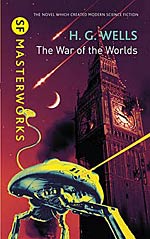
![]() DrPerschon
DrPerschon
12/23/2014
![]()
My introduction to War of the Worldswas a cassette recording of Jeff Wayne's Prog Rock concept album. Richard Burton's reading of the opening lines of H.G. Wells's seminal alien invasion story always send a chill up my spine. I've also taught the novel in many instances of my introductory English course, so it is a book I am very familiar with. i have done close readings of Spielberg's cinematic adaptation, which I consider one of the best film versions. In short,War of the Worlds is one of my favourite stories, and I love seeing it retold over and over again.
it is, being a Wellsian work, more than just an alien invasion story. It was Wells's way of showing his fellow Britons what it would feel like to have the British Empire invade and take over. Without a plausible earthly nation to believably conquer England, Wells imagines a non terrestrial one with weaponry so far advanced that it is beyond human comprehension (this concept was lost upon viewers of the Spielberg film, who quibbled over the implausibility nature of the alien technology, which was as inscrutable to modern audiences as Wells's was to his).
it is the first story of its kind: while other authors had written of aliens, none had written of hostile ones who lacked any anthropomorphic similarities. This is was radical in ways modern readers cannot understand. But for Wells's readers, the idea that there was a species more intelligent than humans wasn't just innovation--for some, it would be heresy.
Consequently,War of the Worlds was more than just an engaging adventure serial--it was a challenge to some of the most foundational ideas Wells's readers held. And because it was written in an objective, journalistic style, it initially had a similar, albeit less histironic, effect to Orson Welles's radio adaptation a few decades later.
Above all, it's supposedly deus ex machine ending remains unsurpassed. Unlike bombastic alien invasion films, War of the Worlds refuses to let its human agents win the war. They survive, not by a God in the machine, but the machine itself: evolution wins the day, not mankind. It's as relevant a cautionary finale today as it was over a century ago: we act as though we are the pinnacle of creation, but our dominance of the planet is ever so fragile.
http://www.steampunkscholar.com